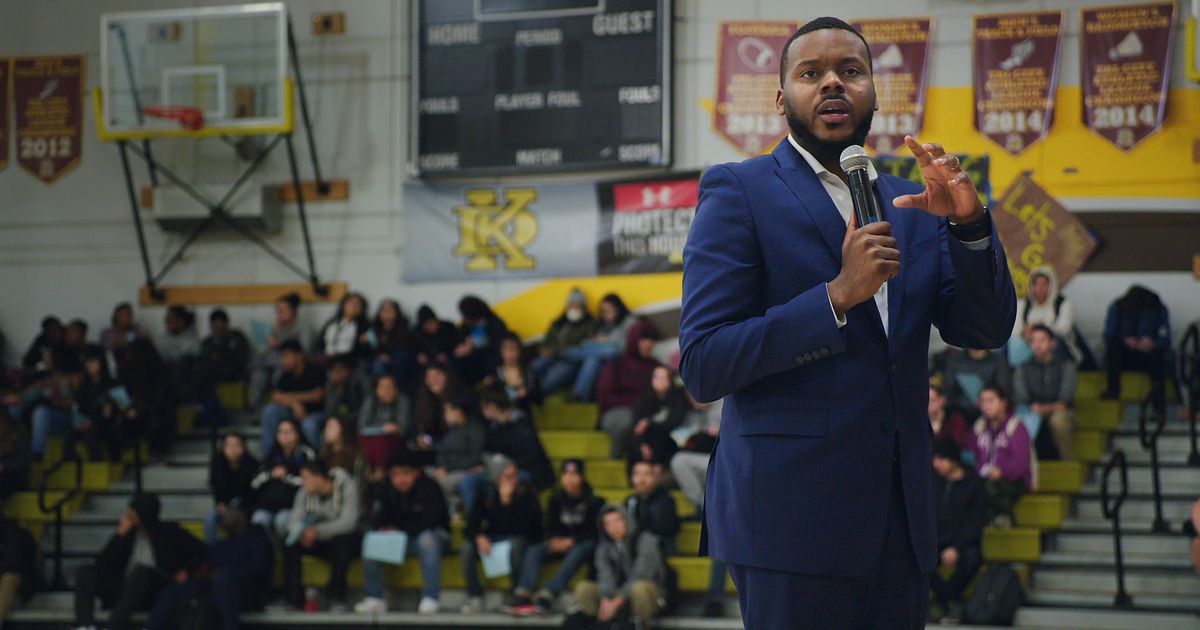
When Stockton Mayor Michael Tubbs came into this world 30 years ago, it seemed unlikely that the world would nurture and one day celebrate his unique gifts.
His mother was a teenager, while his father belonged to a gang and has spent most of Tubbs’ life in state prison. Born and raised in Stockton, their Black son would grow up to become a politician capable of what so many are not: designing and implementing policy that humanizes people otherwise written off by society. That is the story of Stockton on My Mind, a new HBO documentary about a beleaguered city whose residents demonstrate remarkable resilience.
“If you look at Stockton right now, a lot of things that were seeded in this film are beginning to take root, are beginning to blossom,” Tubbs said in an interview, referring to pilot projects that have brought him widespread attention, like college scholarships for high school graduates and a guaranteed monthly income for certain low-income residents.
Stockton, a town of 300,000 people in central California, declared bankruptcy in 2012 and became the foreclosure capital of the United States during the 2008 housing crash. Stockton has emerged from those crises but remains home to many people society deems undeserving of empathy or support, because they live with poverty, experience homelessness, came to this country as migrants, served time in prison, have a mental or physical disability, become trapped in cycles of violence as youth, or aren’t white. Tubbs sees those people’s full humanity, and he wants you to see it, too.
Their stories have largely gone untold. I know because growing up in Sacramento, 60 miles north of Stockton, I saw the city through newspaper headlines and the evening news. Many of those stories featured mugshots of Black and Hispanic men along with details about violent crimes. The coverage seemed to subsume positive reporting, creating a clear message: Avoid Stockton as if your life depends on it.
Tubbs’ life work is to rewrite that narrative, not just for Stockton’s sake but for America’s. When we can look to a city as complicated as Stockton and meaningfully support its residents as they fight for their right to thrive, against all the odds, we move toward that elusive but more perfect union.
In the four years since he became mayor of Stockton at the age of 26, Tubbs has started innovative, privately-funded programs to give graduating high school seniors a college scholarship, send $500 to 125 randomly-chosen low-income residents each month for 18 months, and provide social support and services for youth at risk of engaging in gun violence.
Some of his constituents hate these programs. They mistakenly think he’s wasting their tax dollars on people who can’t be trusted. Tubbs isn’t worried about what participants will do with the money and services they receive. He’s betting that every Stockton resident will benefit from these policies as young people seek education and stay off the streets, and households finally become financially secure. It’s the kind of bet you wish more politicians would make.
As the founder of a new coalition of mayors advocating for guaranteed income, Tubbs hopes to replicate the success of unconditional cash payments on a national scale in order to lift families out of generational poverty.
[embedded content]
Beyond his nerdy penchant for policy solutions, Tubbs possesses a compelling vision of what America can be: a country that, through racial and economic justice, includes and uplifts the most vulnerable among us.
In that America we champion individual agency and responsibility but also possess a collective awareness that our policy choices — how we vote, who we elect, what policies we accept — directly connect to how communities fare. So if homelessness increases, as it has in Stockton and the neighboring Bay Area region, but voters and elected officials refuse to change zoning policies to permit the development of affordable housing, it can’t be acceptable to blame people for failing to try harder.
“Let’s do the opposite of what we did to create harm,” says Tubbs. “If we see that [harm] and don’t make different choices, then we can’t complain. We have to make it really clear for people so there’s no room to hide.”
The pandemic, he says, has laid bare systemic inequity in America. Individual choices cannot explain why so many people are suffering in similar ways — hunger, poor health, economic despair — while billionaires like Jeff Bezos, who added a record $13 billion to his net worth a few days before I spoke to Tubbs, amass even greater wealth.
“Let’s do the opposite of what we did to create harm.”
When I asked him to deliver a vision for how the country could emerge from the crisis with its soul intact, he ticked off three priorities: build resilience in our communities so that those with the fewest economic resources can afford basic necessities; focus on guaranteeing human dignity to all, as the founders set forth in principle, if not practice; and reject racist systems that divest from people and their communities, creating environments ripe for personal and structural violence, which in turn make us all weaker and more vulnerable.
For those who share Tubbs’ values, his vision feels promising in contrast to our dystopian present. Though Tubbs is but one man in a much bigger movement, he makes a compelling case for transformative change at a time when trust in our leaders has cratered.
This hard-won optimism seems to come naturally to Tubbs, and he’s building a track record in Stockton to justify it.
He knows Stockton is a work-in-progress, that victories may be imperfect, but he also lives by a line of scripture his grandmother loved: “The stone that the builders rejected has become the cornerstone.”
